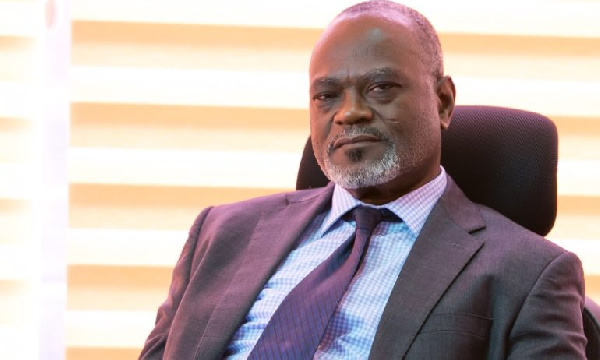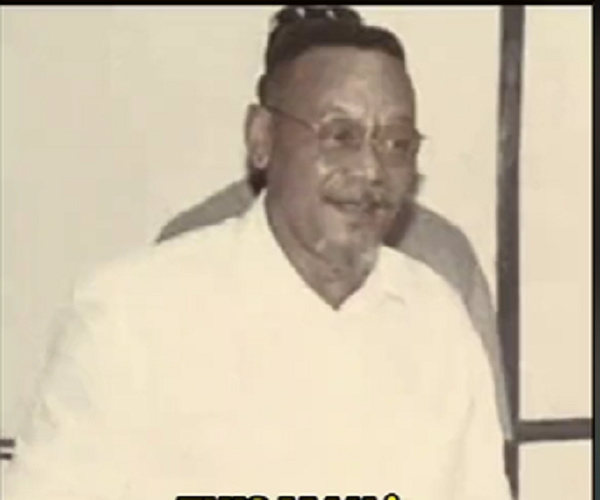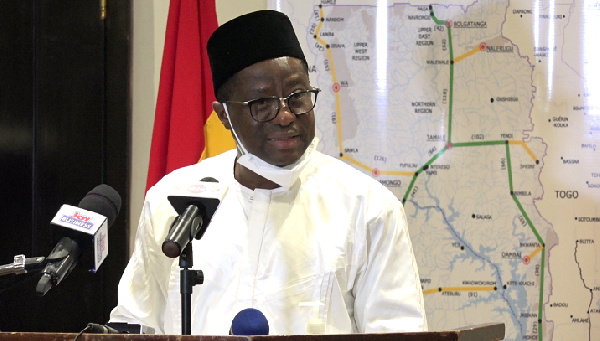

As part of Government of Ghana's initiative to maintain the security of Ghana’s critical infrastructure, internet services and the entire digital ecosystem, Vice President, Dr. Mahamudu Bawumia, Monday 1st October, 2018, launched the National Cyber Security Awareness Month (NCSAM), to respond to the increasing spate of cyber-crimes and cyber security breaches which could potentially undermine the gains from Ghana’s digitalization agenda.
The campaign programme which focused on four key thematic areas namely, children, the public, business and the government, was dubbed, "A Safer Digital Ghana".
Following the launch, the Ministry of Communications came up with a week-long programme which started from Monday, October 22 - Friday 26, 2018, at the Kofi Annan International Peacekeeping Training Centre (KAIPTC).
AT THE FORMAL OPENING OF THE 2018 NCSAM CELEBRATION AT THE KAIPTC - DAY-1 - 22 -10 - 2018.
The President, Nana Addo Dankwa Akufo-Addo, said plans were far advanced to ratify the convention on cybercrimes adopted by some member countries of the United Nations including Ghana.
Being the third African country to sign on since its adoption, the law after ratification will guide the country to develop strategies to fight cyber-attacks. It will also help the country to set up a cyber security academy as well as a National Cyber Security Authority to oversee the operations of all agencies in the digital value chain.
"As a government, we have signed both the Malabo and Budapest Convention which sets the tone for Ghana to implement initiatives on cyber security. I’m happy to announce that when parliament resumes, one of the first sets of laws to ratify is the Budapest Convention," The President said.
CYBERCRIME LOSS
He noted that, statistics from the Cybercrime Unit of the Criminal Investigations Department (CID) indicates that, in 2016, Ghana lost about US$25.8 million, with US$8.4 million in the form of business compromises. The 2017 estimates put the loss at US$ 69 million.
Estimates further showed that, as at August 2018, Ghana had lost US$97 million due to Cybercrime. This is an indication of increasing cybercrime incidence.
However, most of these cybercrime cases were often not reported and the country does not have an active setup to calculate such losses.
MOBILE MONEY
Touching on the use of mobile money, Ghana's Minister for Finance, Ken Ofori-Atta, said that, transactions worth about GHS79 billion was carried out in 2016, which grew to nearly 156 billion in 2017, representing a significant growth of almost double.
However, he said, the current total registered mobile money accounts across the three major Telcos had outstripped the country’s total population.
The latest data from Bank of Ghana’s payment system showed that the registered number of mobile money accounts increased to 29.99 million in June 2018 from 21.36 million recorded in June 2017, representing an increase of 40.40 percent over a one-year period.
To this end, industry estimates showed that 50 percent of the mobile money subscribers had either experienced fraud or were targets for fraudsters.
CALL FOR A CYBER SECURITY CULTURE
The National Cyber Security Advisor, Albert Antwi-Boasiako, on his part advised businesses to inculcate the culture of cyber security to their operations, to avert possible cybercrime incidences.
He noted that, people were most vulnerable to cyber-attacks such as unauthorized access to business data, password compromises, skimming of payments and unauthorized transfer of funds, excessive charges and leakage of confidential data, among others.
Analysis by industry experts based on security audit and forensic investigations identified that, Ghana was at a high risk of losing its financial inclusion potential due to the existing awareness gap regarding the cyber-threats associated with the emerging electronic payment services.
“We need to scale up our efforts to protect our Critical National Information Infrastructure, as well as addressing the existing gaps in our cybercrime and cyber security legislations,” Antwi-Boasiako said.
He further stated that, there was the need to intensify public awareness creation efforts and most importantly, operationalize the country’s international cooperation efforts in addressing the challenges.
DAY-2 (23 - 10 – 2018)
LAUNCH OF CHILD ONLINE PROTECTION
The 2017 Ghana country report revealed that, 7 in 10 children reported that they were exposed to sexual images on online devices, but it was equally common to be exposed to sexual images via TV.
The report said, 70% of the children who reported that they had seen sexual images online, 6 in 10 of them reported that it happened on social networking sites. However, 36% of them reported to had felt uncomfortable, 27% felt embarrassed or shy, while 26% felt neither happy nor upset.
This was contained in a study conducted by UNICEF in collaboration with the government of Ghana through the Ministry of Communications.
Launching the report, the Minister for Communications, Hon. Ursula Owusu-Ekuful, noted that, internet revolution had transformed how information and communication were accessed and how it had increasingly become a valuable resource for children and young people to learn, socialize, innovate and connect.
Anne-Claire Dufay, UNICEF Representative in Ghana, also said, “UNICEF is committed to protection of children from violence, exploitation and abuse and has been supporting the development and implementation of key national child-related policies which seeks to prevent and protect children from all forms of violations.”
“Similarly, UNICEF is keen to prevent and reduce the risks associated with the use if the internet while enabling more children and young people to reap the benefits of a secure and safe online space,” She added.
WORKSHOP FOR JUDICIARY ON CYBERCRIME AND ELECTRONIC EVIDENCE FOR JUDGES
The National Cyber Security Centre through the Ministry of Communications also organised a number of training workshop for judiciary, selected Members of Parliament, Financial Industry and the Criminal Justice Sector on cybercrime and electronic evidence for judges of the Supreme Court.
Opening the ceremony, the Minister for Communications, Hon. Ursula Owusu-Ekuful, stressed on the need to cooperate with international partners in tackling cybercrime; reiterating the President, Nana Addo Dankwa Akufo-Addo’s commitment to the ratification of the Budapest Convention to discuss the domestic legal issues involving cybercrime and the operationalization of the Budapest Convention in the context of Ghana’s domestic legislation.
“Ghana’s accession to the Budapest Convention is borne out of a particular judicial imperative-the need to be able to facilitate cross border investigations and prosecutions of cybercrime cases especially at the time when our citizens are actively using digital services and platforms such as Facebook, WhatsApp and Instagram which are hosted in other jurisdictions."
On his part at the opening, Supreme Court Judge, Justice Gabriel Scott Pwamang, in his remarks said Ghana has chosen to join the rest of the majority of people all over the world. Saying, "We live under democratic transparent constitutional government, therefore, any activity be it the fight against crime, cybersecurity, criminal activity of any kind, has to be investigated, prosecuted and determined in accordance with law."
Emphasising that, any investigative body which is investigating cybercrime, has its eye on what will happen when a culprit is found and arrested and taken to court. This he said was because the democratic principle if the executive, which will do the investigation cannot try the culprit.
"So that is why I think it is very critical and thoughtful for the organizers of this section to have interaction with Judges, in order to get their perspectives and also to share with them the latest trends in cybersecurity and cybercrime," he added. "Now when a matter also ends up in court, it may start from a lower court but, eventually, it's the Supreme Court which has the final say.
And it's the Supreme Court which defines policy for law enforcement as far as the Judiciary is concerned. That is why I think the organizers have done a very critical job in targeting the Supreme Court for these interactions.
Because, then, we will all be on the same page as far as cybercrime is concerned and as far as enforcement of the regulations that will come," Justice Pwamang said.
Prominent among the Judges were; Justice Charles Edward Ekow Baiden, Justice of Criminal Court 2, Justice Paul Baffoe-Bonnie - Supreme Court, Justice Vida Akoto Bamfo - Supreme Court, Justice Julius Ansah - Supreme Court and to name a few.
STATE OF THE ART LABORATORY INAUGURATED - DAY-3 - 24 - 10 - 2018.
The Minister for Communications Hon. Ursula Owusu-Ekuful, again inaugurated a State of the Art Laboratory at the Kofi Annan International Peacekeeping Training Centre (KIPTC) in Accra on Wednesday, 24 October.
She said “Our cyber security professions must be globally competitive in this increasingly interconnected global economy. Raising our standards will put Ghana in stronger positions to be competitive not just domestically but also at the global level”.
According to the Minister, Ghana had experienced a growing cyber threat landscape and the country therefore needed to put in place adequate preparation to protect the Critical National infrastructure as well sensitized Ghanaians against the activities of Cyber criminals.
CYBERCRIME FORUM FOR THE CRIMINAL JUSTICE SECTOR
DAY-4 – 25 - 10 - 2018.
According to the Director of the Cyber Crime Unit of the Criminal Investigation Department (CID), Dr. Herbert Gustav Yankson, Ghana Lost $97m to cyber fraud in the period of August 2016 – 2018, where only 5.7% of the reported fraud cases went under investigations.
Speaking in a presentation dubbed, ‘Security Agencies Response to Cyber Crimes’, as part of the 2018 National Cyber Security Awareness Month (NCSAM) at the Kofi Annan International Peacekeeping Centre (KAIPTC) in Accra on Thursday, 25th October, 2018, he said, this was as a result of victim’s refusal to cooperate with the police, in the name of protecting themselves from public ridicule.
He also attributed the problem to inaccurate SIM registration and the lack of mechanisms meant to validate the large proportion of cards given them.
He therefore, underscored the need to incorporate all Ghana’s laws under one umbrella for easy reference, to aid the fight against cyber fraud in the country.
A Deputy Minister for Communication in charge of cyber security, Hon. Vincent Sowah Odotei at the opening of the Security Governance Initiative (SGI) workshop on cyber risk management noted that Ghana is embarking on a number of digitalization initiatives to formalize the economy.
He cited the introduction of national digital property addressing system, the national identification system, e-justice system, e-emigration and other digitalization projects. “These are the foundation of the smart economy we are working to create as a government”. He added
The workshop, he indicated was an important component of national efforts in addressing cyber security issues especially those involving the critical national information infrastructures (CNIs).” I have been briefed that this course is being run in three different sessions for critical stakeholders including the government sector, telecommunication sector, banking sector, energy sector as well as security and defence institutions. These are the most critical sectors which require this type of training”, he noted
Hon. Odotei was confident that participant will gain understanding of their organisations cyber environment as also to establish strong cyber as well as implement essential best practices to protect their systems, networks, processes, , and people at the end of the workshop
He requested MITRE Corporation through the SGI programme to support the implementation of Ghana’s national cyber security awareness programme.
DAY-5 – 26 - 10 - 2018. PANEL DISCUSSION – PERSPECTIVES OF FORMER MINISTERS FOR COMMUNICATIONS ON GHANA’S CYBERSECURITY
The Minority Leader in Parliament, Haruna Idrissu, Member of Parliament for Tamale South constituency and a former Minister for Communications under the Atta-Mills administration, has called for a collaborative effort in fighting cybercrime.
He emphasised that, Ghana’s communications sector has benefited from consistent continuity in the pursuit of policies and strategies since the forth republic constitution. Stressing that, over the years, the country has situated its communications ministry at the world level.
The immediate past Minister for Communications under the Mahama Administration, Edward Omane Boamah, also underpinned the diversity and dynamic nature of information technology and the need for the country to invest in its cyber space.
According to him, there is the need to invest more in research and in the country’s communications sector. Explaining the need to localize the needs of Ghanaians in order for it to be better addressed.
The Minister for Communications, Ursula Owusu-Ekuful (MP), on her part assured better cyber security practices would be observed in line with Government’s vision of creating a secured cyberspace for businesses and citizens in the country.






